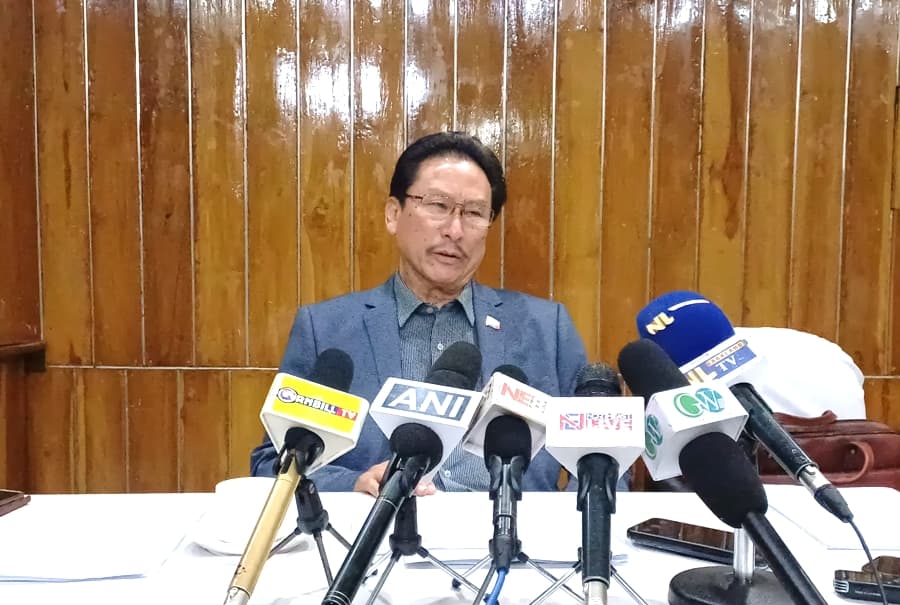Nagaland government urges JCC to end pen-down strike, defends IAS induction process, citing disruption of public services statewide.
Share

KOHIMA — Nagaland government has appealed to the Joint Coordination Committee (JCC) and other agitating groups to call off their ongoing pen-down strike over the IAS induction issue, citing disruption of public services and inconvenience to citizens.
Addressing a press conference in Kohima on Thursday, Minister for Power and Parliamentary Affairs KG Kenye, speaking on behalf of the state Cabinet, said that the government has been closely monitoring the situation and is concerned that essential services are being paralysed.
He added that several important matters requiring government attention have been stalled due to the strike.
Kenye explained that the present issue stems from the March 10, 2025 vacancy circular issued “without the consideration and approval of the competent authority.” The circular was withdrawn on March 25, 2025, and a fresh one was issued on April 24, 2025, in line with the Cabinet’s decision taken on March 27, 2025.
The minister said that the Cabinet, during its October 16 meeting, had noted that the 2020 circular introducing the criterion that “only officers recruited through the NPSC may apply” should have been brought before the Cabinet for approval as it involved a policy matter. No formal notification had followed, he added.
Also read: Nagaland: JCC to continue pen-down strike, sets three-day window for dialogue
The Cabinet subsequently reiterated its earlier decision taken on March 27. A Cabinet sub-committee was also constituted to meet office bearers of the agitating service associations, explain the government’s position, and urge them to end the agitation.
Kenye clarified that one of the names he mentioned earlier—Dr. Zasekuolie Chusi—had been included inadvertently, noting that Chusi was recruited through the NPSC. He said that successive governments have followed the same practice of recommending one vacancy under the non-state civil service (non-SCS) category, and this practice has remained unchanged.
“If there are certain oppositions to this practice and people want to change it, then that requires a policy decision, and anything that has to do with a policy decision has to go through the proper channel,” he said.
The minister informed that the Cabinet had reviewed earlier orders, including those from 1954 and 1997, as well as the DoPT guidelines, before proceeding with its recommendation. He acknowledged the JCC’s view that the policy should be reviewed but maintained that it would not be feasible to retract the process at this stage, as the state screening committee had already shortlisted five out of eleven applicants and forwarded the list to the Centre.
Following this, the JCC wrote to the UPSC and DoPT, asking them to review the state government’s recommendation. Kenye said that the state will now wait for the Centre’s observation—whether the government violated any guidelines or procedures under the 1954 and 1997 IAS appointment and selection rules.
“In such a situation, while waiting for updates, it is important to resolve the issue internally and not let a third party intervene,” he said, stressing that the state was merely following the established procedure.
Kenye appealed to the JCC to “reconsider their stand for the sake and interest of the state and its people” and to restore normalcy so that the government could resume functioning effectively.
Citing a similar case from Rajasthan, Kenye said that on February 1, 2025, the Rajasthan High Court dismissed a petition challenging the selection of non-SCS officers for IAS promotion and imposed a fine of INR 5 lakh (later reduced to INR 2 lakh by the Supreme Court). He said the case set a precedent since both states are governed under the same Constitution and judiciary.
Kaito appeals
Minister for Roads and Bridges G Kaito Aye, in a personal letter addressed to the convenor and members of the JCC, urged the agitating associations to put the strike on hold and engage in dialogue to resolve the issue.
Aye acknowledged the concerns raised by the JCC but reminded them that the pen-down strike has disrupted public offices and delayed time-bound, externally aided projects critical to infrastructure and livelihood improvement.
“Let us not drift into a situation where public offices and services are overshadowed by the course of agitation,” he wrote.